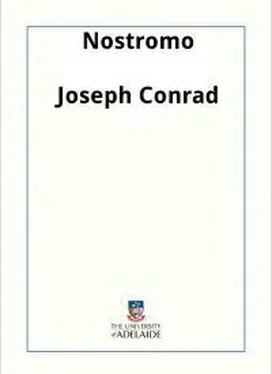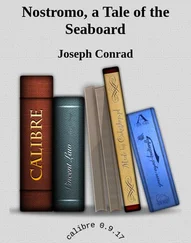Джозеф Конрад - Nostromo - A Tale of the Seaboard
Здесь есть возможность читать онлайн «Джозеф Конрад - Nostromo - A Tale of the Seaboard» весь текст электронной книги совершенно бесплатно (целиком полную версию без сокращений). В некоторых случаях можно слушать аудио, скачать через торрент в формате fb2 и присутствует краткое содержание. Год выпуска: 2006, Жанр: Классическая проза, на английском языке. Описание произведения, (предисловие) а так же отзывы посетителей доступны на портале библиотеки ЛибКат.
- Название:Nostromo: A Tale of the Seaboard
- Автор:
- Жанр:
- Год:2006
- ISBN:нет данных
- Рейтинг книги:4 / 5. Голосов: 1
-
Избранное:Добавить в избранное
- Отзывы:
-
Ваша оценка:
- 80
- 1
- 2
- 3
- 4
- 5
Nostromo: A Tale of the Seaboard: краткое содержание, описание и аннотация
Предлагаем к чтению аннотацию, описание, краткое содержание или предисловие (зависит от того, что написал сам автор книги «Nostromo: A Tale of the Seaboard»). Если вы не нашли необходимую информацию о книге — напишите в комментариях, мы постараемся отыскать её.
Nostromo: A Tale of the Seaboard — читать онлайн бесплатно полную книгу (весь текст) целиком
Ниже представлен текст книги, разбитый по страницам. Система сохранения места последней прочитанной страницы, позволяет с удобством читать онлайн бесплатно книгу «Nostromo: A Tale of the Seaboard», без необходимости каждый раз заново искать на чём Вы остановились. Поставьте закладку, и сможете в любой момент перейти на страницу, на которой закончили чтение.
Интервал:
Закладка:
“No. That is unnecessary,” whispered Mrs. Gould, once more averting her head.
“It is. Except one little fact, that your husband does not like me. It’s a small matter, which, in the circumstances, seems to acquire a perfectly ridiculous importance. Ridiculous and immense; for, clearly, money is required for my plan,” he reflected; then added, meaningly, “and we have two sentimentalists to deal with.”
“I don’t know that I understand you, Don Martin,” said Mrs. Gould, coldly, preserving the low key of their conversation. “But, speaking as if I did, who is the other?”
“The great Holroyd in San Francisco, of course,” Decoud whispered, lightly. “I think you understand me very well. Women are idealists; but then they are so perspicacious.”
But whatever was the reason of that remark, disparaging and complimentary at the same time, Mrs. Gould seemed not to pay attention to it. The name of Holroyd had given a new tone to her anxiety.
“The silver escort is coming down to the harbour tomorrow; a whole six months’ working, Don Martin!” she cried in dismay.
“Let it come down, then,” breathed out Decoud, earnestly, almost into her ear.
“But if the rumour should get about, and especially if it turned out true, troubles might break out in the town,” objected Mrs. Gould.
Decoud admitted that it was possible. He knew well the town children of the Sulaco Campo: sullen, thievish, vindictive, and bloodthirsty, whatever great qualities their brothers of the plain might have had. But then there was that other sentimentalist, who attached a strangely idealistic meaning to concrete facts. This stream of silver must be kept flowing north to return in the form of financial backing from the great house of Holroyd. Up at the mountain in the strong room of the mine the silver bars were worth less for his purpose than so much lead, from which at least bullets may be run. Let it come down to the harbour, ready for shipment.
The next north-going steamer would carry it off for the very salvation of the San Tome mine, which had produced so much treasure. And, moreover, the rumour was probably false, he remarked, with much conviction in his hurried tone.
“Besides, senora,” concluded Decoud, “we may suppress it for many days. I have been talking with the telegraphist in the middle of the Plaza Mayor; thus I am certain that we could not have been overheard. There was not even a bird in the air near us. And also let me tell you something more. I have been making friends with this man called Nostromo, the Capataz. We had a conversation this very evening, I walking by the side of his horse as he rode slowly out of the town just now. He promised me that if a riot took place for any reason—even for the most political of reasons, you understand—his Cargadores, an important part of the populace, you will admit, should be found on the side of the Europeans.”
“He has promised you that?” Mrs. Gould inquired, with interest. “What made him make that promise to you?”
“Upon my word, I don’t know,” declared Decoud, in a slightly surprised tone. “He certainly promised me that, but now you ask me why, I could not tell you his reasons. He talked with his usual carelessness, which, if he had been anything else but a common sailor, I would call a pose or an affectation.”
Decoud, interrupting himself, looked at Mrs. Gould curiously.
“Upon the whole,” he continued, “I suppose he expects something to his advantage from it. You mustn’t forget that he does not exercise his extraordinary power over the lower classes without a certain amount of personal risk and without a great profusion in spending his money. One must pay in some way or other for such a solid thing as individual prestige. He told me after we made friends at a dance, in a Posada kept by a Mexican just outside the walls, that he had come here to make his fortune. I suppose he looks upon his prestige as a sort of investment.”
“Perhaps he prizes it for its own sake,” Mrs. Gould said in a tone as if she were repelling an undeserved aspersion. “Viola, the Garibaldino, with whom he has lived for some years, calls him the Incorruptible.”
“Ah! he belongs to the group of your proteges out there towards the harbour, Mrs. Gould. Muy bien. And Captain Mitchell calls him wonderful. I have heard no end of tales of his strength, his audacity, his fidelity. No end of fine things. H’m! incorruptible! It is indeed a name of honour for the Capataz of the Cargadores of Sulaco. Incorruptible! Fine, but vague. However, I suppose he’s sensible, too. And I talked to him upon that sane and practical assumption.”
“I prefer to think him disinterested, and therefore trustworthy,” Mrs. Gould said, with the nearest approach to curtness it was in her nature to assume.
“Well, if so, then the silver will be still more safe. Let it come down, senora. Let it come down, so that it may go north and return to us in the shape of credit.”
Mrs. Gould glanced along the corredor towards the door of her husband’s room. Decoud, watching her as if she had his fate in her hands, detected an almost imperceptible nod of assent. He bowed with a smile, and, putting his hand into the breast pocket of his coat, pulled out a fan of light feathers set upon painted leaves of sandal-wood. “I had it in my pocket,” he murmured, triumphantly, “for a plausible pretext.” He bowed again. “Good-night, senora.”
Mrs. Gould continued along the corredor away from her husband’s room. The fate of the San Tome mine was lying heavy upon her heart. It was a long time now since she had begun to fear it. It had been an idea. She had watched it with misgivings turning into a fetish, and now the fetish had grown into a monstrous and crushing weight. It was as if the inspiration of their early years had left her heart to turn into a wall of silver-bricks, erected by the silent work of evil spirits, between her and her husband. He seemed to dwell alone within a circumvallation of precious metal, leaving her outside with her school, her hospital, the sick mothers and the feeble old men, mere insignificant vestiges of the initial inspiration. “Those poor people!” she murmured to herself.
Below she heard the voice of Martin Decoud in the patio speaking loudly:
“I have found Dona Antonia’s fan, Basilio. Look, here it is!”
CHAPTER SEVEN
It was part of what Decoud would have called his sane materialism that he did not believe in the possibility of friendship between man and woman.
The one exception he allowed confirmed, he maintained, that absolute rule. Friendship was possible between brother and sister, meaning by friendship the frank unreserve, as before another human being, of thoughts and sensations; all the objectless and necessary sincerity of one’s innermost life trying to re-act upon the profound sympathies of another existence.
His favourite sister, the handsome, slightly arbitrary and resolute angel, ruling the father and mother Decoud in the first-floor apartments of a very fine Parisian house, was the recipient of Martin Decoud’s confidences as to his thoughts, actions, purposes, doubts, and even failures. . . .
“Prepare our little circle in Paris for the birth of another South American Republic. One more or less, what does it matter? They may come into the world like evil flowers on a hotbed of rotten institutions; but the seed of this one has germinated in your brother’s brain, and that will be enough for your devoted assent. I am writing this to you by the light of a single candle, in a sort of inn, near the harbour, kept by an Italian called Viola, a protege of Mrs. Gould. The whole building, which, for all I know, may have been contrived by a Conquistador farmer of the pearl fishery three hundred years ago, is perfectly silent. So is the plain between the town and the harbour; silent, but not so dark as the house, because the pickets of Italian workmen guarding the railway have lighted little fires all along the line. It was not so quiet around here yesterday. We had an awful riot—a sudden outbreak of the populace, which was not suppressed till late today. Its object, no doubt, was loot, and that was defeated, as you may have learned already from the cablegram sent via San Francisco and New York last night, when the cables were still open. You have read already there that the energetic action of the Europeans of the railway has saved the town from destruction, and you may believe that. I wrote out the cable myself. We have no Reuter’s agency man here. I have also fired at the mob from the windows of the club, in company with some other young men of position. Our object was to keep the Calle de la Constitucion clear for the exodus of the ladies and children, who have taken refuge on board a couple of cargo ships now in the harbour here. That was yesterday. You should also have learned from the cable that the missing President, Ribiera, who had disappeared after the battle of Sta. Marta, has turned up here in Sulaco by one of those strange coincidences that are almost incredible, riding on a lame mule into the very midst of the street fighting. It appears that he had fled, in company of a muleteer called Bonifacio, across the mountains from the threats of Montero into the arms of an enraged mob.
Читать дальшеИнтервал:
Закладка:
Похожие книги на «Nostromo: A Tale of the Seaboard»
Представляем Вашему вниманию похожие книги на «Nostromo: A Tale of the Seaboard» списком для выбора. Мы отобрали схожую по названию и смыслу литературу в надежде предоставить читателям больше вариантов отыскать новые, интересные, ещё непрочитанные произведения.
Обсуждение, отзывы о книге «Nostromo: A Tale of the Seaboard» и просто собственные мнения читателей. Оставьте ваши комментарии, напишите, что Вы думаете о произведении, его смысле или главных героях. Укажите что конкретно понравилось, а что нет, и почему Вы так считаете.












